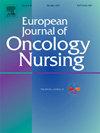Exploration of family members’ perceptions of an online resource to provide information and support for patients with head and neck cancer and their informal carers: a qualitative study
IF 2.7
3区 医学
Q1 NURSING
引用次数: 0
Abstract
Purpose
Family members of HNC (head and neck cancer) patients report the highest level of unmet needs compared to other tumour groups. They are integral in supporting treatment decision-making and provide physical and emotional care. Availability of the internet increases access to health information. Currently, HNC websites provide minimal person-centred information to assist family members in their pivotal role. This is paramount to improve outcomes for patients and family members. This study explores family members’ perceptions surrounding the development and utility of an online resource to support carers and patients across treatment trajectories.
Methods
A qualitative research design was adopted using semi-structured interviews. 13 family members of HNC patients were interviewed in a United Kingdom healthcare trust, from March–May 2022. Key themes were inductively developed using reflexive thematic analysis.
Results
Three themes emerged from 13 family members: (1) Information is pivotal to improve understanding of journey ahead and promote decision-making and coping; (2) Family members need for information and support to equip them for new role as care-provider and (3) Family members perceptions of how to promote acceptability of an online resource.
Conclusion
Family members require detailed, reliable information, promoting decision-making, self-management and coping. A blended approach of clinician-led face-to-face information augmented by online information is favourable, enabling information on-demand, reducing feelings of bombardment and isolation. Patient narratives within an online resource could provide clear and real-life insights, facilitating contextualisation of clinical information. These findings will inform the co-design of a HNC online resource for patients and family members.
探索家庭成员对为头颈癌患者及其非正式照护者提供信息和支持的在线资源的看法:一项定性研究
目的:与其他肿瘤组相比,HNC(头颈癌)患者的家庭成员报告的未满足需求水平最高。他们在支持治疗决策和提供身体和情感护理方面是不可或缺的。互联网的可用性增加了获取卫生信息的机会。目前,HNC网站提供的以人为本的信息很少,无法帮助家庭成员发挥其关键作用。这对于改善患者和家属的预后至关重要。本研究探讨了家庭成员对在线资源的开发和利用的看法,以支持护理人员和患者的治疗轨迹。方法采用半结构化访谈的定性研究设计。从2022年3月至5月,在英国一家医疗信托机构对HNC患者的13名家庭成员进行了采访。利用反身性主题分析归纳出关键主题。结果从13名家庭成员中得出三个主题:(1)信息是提高对未来旅程的理解,促进决策和应对的关键;(2)家庭成员需要信息和支持,以装备他们作为护理提供者的新角色;(3)家庭成员对如何促进在线资源的可接受性的看法。结论家庭成员需要详细、可靠的信息,促进决策、自我管理和应对。由临床医生主导的面对面信息与在线信息相结合的混合方法是有利的,使信息按需提供,减少轰炸和孤立感。在线资源中的患者叙述可以提供清晰和真实的见解,促进临床信息的语境化。这些发现将为患者和家属共同设计HNC在线资源提供信息。
本文章由计算机程序翻译,如有差异,请以英文原文为准。
求助全文
约1分钟内获得全文
求助全文
来源期刊
CiteScore
4.40
自引率
3.60%
发文量
109
审稿时长
57 days
期刊介绍:
The European Journal of Oncology Nursing is an international journal which publishes research of direct relevance to patient care, nurse education, management and policy development. EJON is proud to be the official journal of the European Oncology Nursing Society.
The journal publishes the following types of papers:
• Original research articles
• Review articles

 求助内容:
求助内容: 应助结果提醒方式:
应助结果提醒方式:


